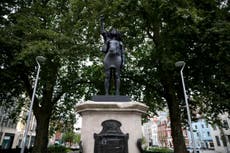Bristol council calls for parliamentary inquiry into slavery reparations
Councillors voted in favour of reparations plan on Tuesday
Your support helps us to tell the story
From reproductive rights to climate change to Big Tech, The Independent is on the ground when the story is developing. Whether it's investigating the financials of Elon Musk's pro-Trump PAC or producing our latest documentary, 'The A Word', which shines a light on the American women fighting for reproductive rights, we know how important it is to parse out the facts from the messaging.
At such a critical moment in US history, we need reporters on the ground. Your donation allows us to keep sending journalists to speak to both sides of the story.
The Independent is trusted by Americans across the entire political spectrum. And unlike many other quality news outlets, we choose not to lock Americans out of our reporting and analysis with paywalls. We believe quality journalism should be available to everyone, paid for by those who can afford it.
Your support makes all the difference.Bristol City Council is calling for a parliamentary inquiry to examine how the UK could pay reparations for its role in the transatlantic slave trade.
Councillors will write to MPs after voting 47-12 in favour of an "atonement and reparations" plan at a full council meeting on Tuesday evening.
Documents accompanying Tuesday's meeting said reparations were necessary "for achieving social justice" and eradicating "racism and racial hierarchy".
Green Party councillor Cleo Lake, who led the motion, said its passing marked a "historic moment" in helping to "atone and repair from the past".
The motion was opposed by the council's Conservative group, who said it risked "exacerbating some divisions".
The call comes some eight months after demonstrators toppled a statue of the 18th-century slave trader Edward Colston in Bristol amid a wave of Black Lives Matter protests.
The controversial statue was pulled across the city and dumped in the harbour, which once prospered from the slave trade.
Labour councillor and deputy mayor Asher Craig told the full council meeting that the pulling down of the statue was a symbolic demonstration of Bristol's "complex relationship with race".
Councillors in favour of the motion said reparations could include compensation, but that the issue was about more than money.
"This is about equity and understanding," said Ms Lake. "Reparation does include but goes beyond monetary compensation."
She added: "It is of international significance that this cross-party motion has passed. History is made. Bristol is now the first core city in the UK to give our support to the growing campaign for reparations.”
Councillor Steve Smith said the Conservative group was unable to support the motion.
He said: "We believe the motion risks exacerbating some divisions by promoting a binary view of the world when the reality is much more complicated."
The motion came from a "good place", he added, but the risk remained.
Councillors will now write to MPs asking them to set up a cross-party group to investigate how reparations might be delivered.
Former prime minister David Cameron ruled out reparations for Britain's role in the slave trade and urged Caribbean countries to "move on" during a 2015 visit to Jamaica.
Bristol's Labour mayor Marvin Rees said the complexity surrounding the conversation on race and the slave trade should not prevent it from being debated.
"The thing that really appeals to me is the chance to have a national and international discussion," he said. "As the first directly elected black mayor in Europe, I can also tell you I'm not just the mayor."
Mr Rees added: "I still experience the world as a black man and even within this organisation I experience the consequences of having black skin. Race is an ever-present reality that does not disappear just because we would like to wish it away."




Join our commenting forum
Join thought-provoking conversations, follow other Independent readers and see their replies
Comments